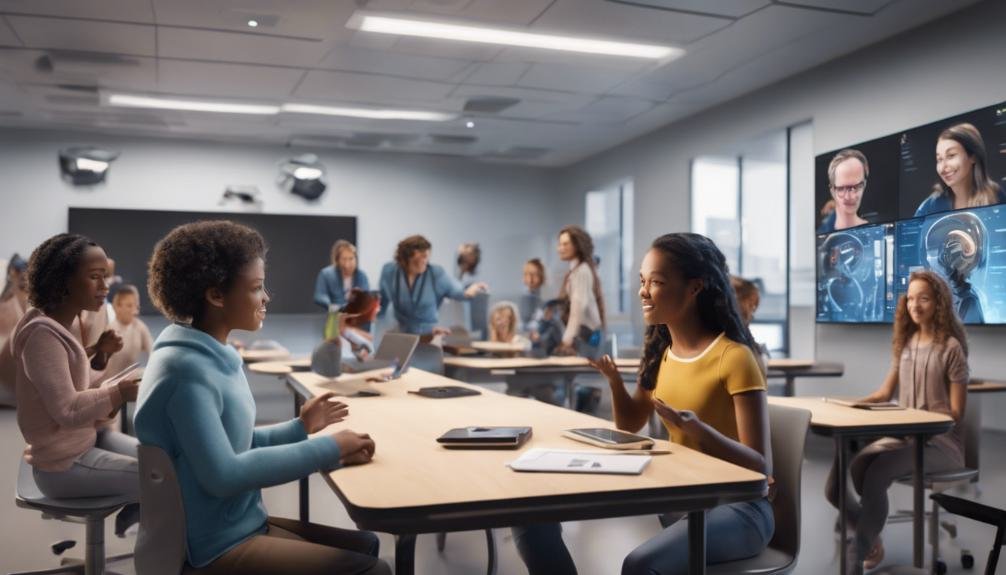AI for Simulation-Based Learning
As you ponder the coincidental evolution of technology and education, imagine a world where AI seamlessly integrates with simulation-based learning to enhance your educational journey. What if your learning experiences were customized to suit your unique needs, offering tailored challenges and real-time feedback to boost your problem-solving skills? The possibilities that AI brings to simulation-based learning are endless, promising a future where education is not just informative but truly transformative.
Key Takeaways
- AI enhances student engagement with real-time feedback and personalized learning experiences.
- Personalized simulations adjust to individual progress, improving critical thinking skills.
- Adaptive scenarios challenge problem-solving abilities and foster creative thinking.
- Data-driven optimization tailors simulations to individual proficiency levels.
- Customized feedback mechanisms and interactive elements boost interactivity and skill development.
Enhancing Student Engagement
Utilizing AI in simulation-based learning can greatly enhance student engagement by providing real-time feedback and personalized learning experiences. By leveraging AI algorithms, educators can tailor simulations to meet individual student needs, consequently increasing motivation and promoting active learning.
Through the analysis of student interactions within the simulation, AI can identify areas where students may be struggling and offer immediate feedback to guide them towards mastering the concepts.
AI can also create dynamic scenarios that adapt to the student's progress, ensuring a challenging yet achievable learning experience. This adaptability keeps students actively engaged, as the simulations evolve based on their responses in real-time.
Additionally, AI-powered simulations can simulate real-world scenarios, allowing students to apply theoretical knowledge in practical situations, further enhancing their engagement and understanding of the subject matter.
Personalizing Learning Experiences
In simulation-based learning, AI leverages student interactions to personalize learning experiences, facilitating tailored feedback and adaptive scenarios to enhance engagement and comprehension.
Personalized challenges are dynamically generated based on individual progress and performance, ensuring that each learner is appropriately challenged to optimize skill development. Through adaptive learning algorithms, AI analyzes user responses in real-time, adjusting the difficulty level and content presentation to match the learner's pace and preferences. This individualized approach not only boosts motivation but also promotes deeper understanding by catering to the unique learning needs of each student.
Essential feedback plays a pivotal role in this process, providing learners with specific insights into their strengths and areas for improvement. Interactive modules further enhance the personalized learning experience by offering opportunities for hands-on practice and immediate application of knowledge. By customizing content delivery and assessment methods, AI empowers learners to actively engage with the material, fostering a more effective and enjoyable learning journey.
Improving Critical Thinking Skills
Enhance cognitive abilities through targeted exercises and analytical tasks designed to sharpen critical thinking skills in simulation-based learning environments. Cognitive challenges present unique opportunities for AI integration in educational settings. By leveraging AI algorithms, educators can create personalized learning experiences that adapt to individual student needs, fostering strategic thinking and enhancing problem-solving capabilities.
Through the application of advanced technology, simulation-based learning environments provide a dynamic platform for students to engage with complex scenarios, analyze information, and make informed decisions. AI integration enables real-time feedback and assessment, guiding learners to develop critical thinking skills effectively. By incorporating interactive simulations and virtual scenarios, students can immerse themselves in hands-on experiences that require thoughtful analysis and decision-making.
Strategic thinking is cultivated through exposure to diverse challenges and scenarios, encouraging learners to explore different perspectives and approaches. Technology application in simulation-based learning empowers students to develop essential skills for success in today's rapidly evolving digital landscape, preparing them to tackle complex problems with confidence and innovation.
Fostering Problem-Solving Abilities
You can enhance critical thinking skills by leveraging AI for simulation-based learning, providing dynamic scenarios that challenge your problem-solving abilities.
By encouraging creative problem-solving through interactive simulations, AI can help you develop adaptive thinking strategies in diverse situations.
This approach fosters a proactive mindset, enabling you to tackle complex problems with confidence and agility.
Enhancing Critical Thinking Skills
Moreover, by engaging with AI-driven simulation-based learning tools, you can develop and refine your critical thinking skills, ultimately fostering your problem-solving abilities in a dynamic and interactive environment.
These tools present cognitive challenges through interactive scenarios, facilitating scenario-based learning and decision-making exercises that push you to analyze complex situations, evaluate different options, and make informed choices.
Through the utilization of AI technology, these simulations adapt to your responses, providing personalized feedback and guidance tailored to your individual learning needs. This adaptive nature enhances your critical thinking skills by challenging you to think logically, critically assess information, and strategize effective solutions.
Moreover, the interactive nature of these simulations immerses you in realistic scenarios, allowing you to practice applying theoretical knowledge to practical situations, honing your problem-solving abilities in a risk-free environment.
Encouraging Creative Problem-Solving
Engaging with AI-driven simulation-based learning tools prompts the development of innovative problem-solving skills, fostering your ability to approach challenges creatively and strategically.
Through the integration of brainstorming exercises, AI simulations encourage you to explore multiple solutions, enhancing your capacity to think outside the box. These exercises push you to analyze problems from different perspectives, stimulating creativity and adaptive thinking.
Collaborative challenges within AI simulations further enhance your problem-solving abilities by fostering teamwork and communication skills. Working with peers to tackle complex scenarios not only broadens your problem-solving strategies but also promotes a collective intelligence approach to overcoming obstacles.
Optimizing Educational Simulations
To enhance the effectiveness of educational simulations, employ data-driven optimization techniques to refine the learning experience. AI optimization plays a pivotal role in tailoring interactive simulations to meet the diverse needs of learners. By leveraging AI algorithms, simulations can dynamically adapt based on user interactions, ensuring a personalized and engaging educational journey.
Through AI optimization, interactive simulations can analyze vast amounts of data in real-time, allowing for immediate adjustments to content delivery, pacing, and complexity. This enables simulations to provide targeted challenges that align with each learner's proficiency level, promoting continuous growth and knowledge retention.
Furthermore, AI-powered simulations can track user progress and performance metrics with precision, offering valuable insights to educators for fine-tuning the learning experience. By utilizing advanced analytics, educational simulations can identify areas where learners excel and pinpoint areas that require reinforcement, leading to a more efficient and effective learning process.
Customizing Feedback Mechanisms
You can enhance the learning experience by implementing personalized feedback options, adaptive assessment strategies, and targeted performance insights. These mechanisms allow learners to receive tailored guidance based on their individual progress and needs, maximizing the effectiveness of simulation-based learning.
Personalized Feedback Options
Implementing personalized feedback options in simulation-based learning systems enhances learner engagement and promotes more effective knowledge retention. By integrating real-time recommendations and interactive feedback mechanisms, learners receive immediate guidance tailored to their specific needs, fostering a more dynamic and personalized learning experience.
Vital assessments play a pivotal role in this process, allowing the system to adapt to individual learner performance levels and preferences. Through adaptive learning techniques, the system can analyze user interactions and performance data to provide tailored feedback that addresses areas of improvement while reinforcing strengths. This continuous feedback loop not only supports learners in mastering concepts but also boosts motivation and self-efficacy.
With personalized feedback options, learners can benefit from targeted guidance that aligns with their unique learning styles and pace. The interactive nature of this feedback fosters active learner participation and deeper understanding of the material, enhancing overall learning outcomes.
Adaptive Assessment Strategies
Utilizing adaptive assessment strategies in simulation-based learning systems revolutionizes the customization of feedback mechanisms to cater to individual learner needs and enhance educational outcomes. By integrating machine learning and adaptive algorithms, these systems can dynamically adjust the assessment criteria based on the learner's performance in real-time.
Machine learning algorithms analyze the learner's interactions within the simulation, identifying patterns and areas of strength or weakness. These insights are then used to tailor the feedback provided to the learner, offering targeted guidance and resources to address specific learning gaps.
Adaptive assessment strategies not only personalize the learning experience but also optimize the efficiency of the educational process. Through continuous evaluation and adaptation, learners receive feedback that's relevant to their current level of understanding, fostering a deeper engagement with the material.
The seamless integration of machine learning and adaptive algorithms guarantees that feedback is timely, accurate, and actionable, empowering learners to make meaningful progress towards their educational goals.
Targeted Performance Insights
In addition, customizing feedback mechanisms through targeted performance insights enhances the effectiveness of simulation-based learning systems by providing learners with tailored guidance based on their individual interactions and progress.
By leveraging predictive analytics, educators can anticipate learner needs and deliver personalized feedback. Machine learning algorithms can analyze vast amounts of data to identify patterns in user behavior, allowing for the creation of individualized feedback loops.
Through data visualization techniques, learners can track their progress visually, enabling a deeper understanding of their strengths and areas needing improvement.
These targeted insights not only enhance user engagement but also foster a more dynamic learning experience. By receiving feedback that's specific to their performance, learners are motivated to actively engage with the simulation, leading to increased retention and application of knowledge.
Moreover, personalized feedback promotes a sense of accomplishment and encourages continuous learning. By integrating predictive analytics and data visualization into feedback mechanisms, simulation-based learning systems can provide learners with valuable insights tailored to their unique learning journey.
Increasing Interactivity in Learning
Enhancing learner engagement through interactive elements is essential in optimizing the efficacy of simulation-based learning experiences. Interactive simulations and engaging activities play a fundamental role in creating immersive experiences that foster interactive learning. By incorporating interactive elements into simulations, learners are actively engaged in the learning process, leading to better retention and understanding of the material.
Interactive simulations provide a hands-on approach that allows learners to apply theoretical knowledge in practical scenarios, making the learning experience more dynamic and engaging. Engaging activities such as quizzes, case studies, and role-playing exercises further enhance interactivity, promoting active participation and knowledge application.
Through immersive experiences, learners are immersed in virtual environments that simulate real-world situations, enabling them to practice skills in a safe and controlled setting. This interactive learning approach not only increases learner engagement but also helps develop critical thinking, problem-solving, and decision-making skills.
Enhancing Real-World Skill Development
To optimize skill development in real-world scenarios, consider integrating practical application exercises within simulation-based learning environments. Skill retention is greatly enhanced when learners are immersed in real-world applications rather than solely theoretical concepts. Practical learning offers a hands-on experience that deepens understanding and improves proficiency.
By incorporating elements that mimic real-world challenges, such as interactive scenarios and problem-solving tasks, learners can apply their knowledge in a simulated environment before moving to actual practice. This approach not only boosts engagement but also guarantees that individuals are better prepared for real-world application.
Research shows that hands-on experiences lead to better skill acquisition and retention. When learners actively engage with tasks that mirror authentic situations, they're more likely to transfer these skills to their professional endeavors.
As technology advances, leveraging simulation-based learning for practical skill development becomes increasingly important for preparing individuals for the demands of the modern workforce.
Shaping the Future of Education
Revolutionizing traditional educational paradigms, artificial intelligence (AI) is reshaping the future of learning through advanced data analytics and personalized adaptive learning pathways. AI advancements are driving an educational transformation by enabling institutions to tailor learning experiences to individual needs. By leveraging AI algorithms, educators can analyze vast amounts of data to identify patterns and trends, allowing for the creation of more effective teaching strategies. This personalized approach to learning not only enhances student engagement but also improves knowledge retention and application.
Future technology holds the promise of further revolutionizing the educational landscape. As AI continues to evolve, learning platforms will become more intuitive and responsive, providing students with real-time feedback and adaptive content delivery. This learning evolution will empower learners to progress at their own pace, filling knowledge gaps and building on strengths.
Through the integration of AI advancements into education, the future holds endless possibilities for personalized, data-driven learning experiences that cater to the diverse needs of students worldwide.
Conclusion
In the ever-evolving landscape of education, AI for simulation-based learning is the key to opening up a world of personalized, interactive, and adaptive learning experiences.
Like a masterful conductor, AI orchestrates a symphony of engagement, customization, and skill development, shaping the future of education into a dynamic and immersive journey.
With AI at the helm, learners set off on a transformative voyage towards enhanced critical thinking, problem-solving, and real-world application of knowledge.
The future of education is bright with AI leading the way.







